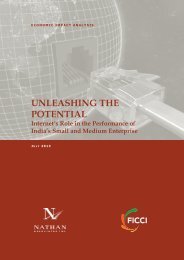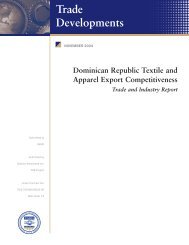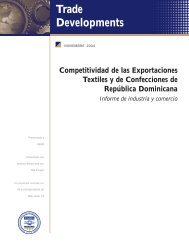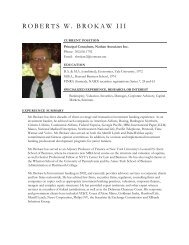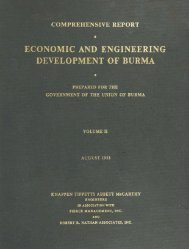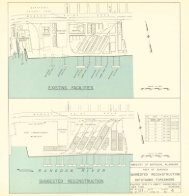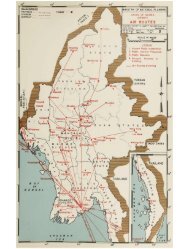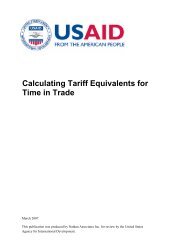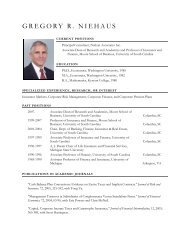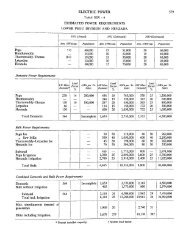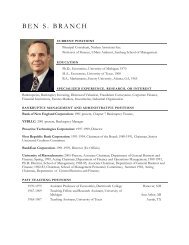Putting it to Work in Developing Countries - Nathan Associates
Putting it to Work in Developing Countries - Nathan Associates
Putting it to Work in Developing Countries - Nathan Associates
Create successful ePaper yourself
Turn your PDF publications into a flip-book with our unique Google optimized e-Paper software.
Figure 4-3<br />
Selected Service Industries: Change <strong>in</strong> Develop<strong>in</strong>g <strong>Countries</strong>’<br />
Share of Global S<strong>to</strong>ck of Inward FDI, 1990-2004<br />
Percentage po<strong>in</strong>t<br />
20<br />
20<br />
15<br />
10<br />
6<br />
7<br />
7<br />
5<br />
0<br />
-7 -16<br />
-7<br />
-5<br />
-10<br />
-15<br />
-20<br />
Electric<strong>it</strong>y, gas,<br />
and water<br />
Construction<br />
Trade<br />
Hotels and<br />
restaurants<br />
Transport, s<strong>to</strong>rage,<br />
and communications<br />
F<strong>in</strong>ance<br />
Bus<strong>in</strong>ess<br />
activ<strong>it</strong>ies<br />
Note: Includes all countries classified as “develop<strong>in</strong>g” by UNCTAD. UNCTAD classifies some countries as develop<strong>in</strong>g<br />
that the World Bank considers “high <strong>in</strong>come,” such as S<strong>in</strong>gapore and South Korea, and classifies some as developed<br />
that the World Bank considers “low and middle <strong>in</strong>come,” such as Es<strong>to</strong>nia, the Czech Republic, and Hungary. Data for<br />
the countries <strong>in</strong> UNCTAD’s “South-East Europe and the Commonwealth of Independent States” category are<br />
<strong>in</strong>cluded <strong>in</strong> the develop<strong>in</strong>g country <strong>to</strong>tals for 2004, but data for these countries are not available by sec<strong>to</strong>r and<br />
<strong>in</strong>dustry for 1990.<br />
SOURCE: <strong>Nathan</strong> <strong>Associates</strong>, based on UNCTAD, World Investment Report 2006, Annex Table A.1.2.<br />
tremendous appeal <strong>to</strong> mult<strong>in</strong>ationals. Realiz<strong>in</strong>g<br />
even part of the potential pipel<strong>in</strong>e of the enormous<br />
market-seek<strong>in</strong>g FDI opportun<strong>it</strong>ies <strong>in</strong> these<br />
two economies alone may well boost the develop<strong>in</strong>g<br />
world’s future shares of global <strong>in</strong>ward FDI<br />
s<strong>to</strong>ck <strong>in</strong> services, <strong>in</strong>clud<strong>in</strong>g shares <strong>in</strong> public util<strong>it</strong>ies,<br />
f<strong>in</strong>ance, and transportation, where develop<strong>in</strong>g<br />
countries have lagged the global rate of FDI<br />
growth.<br />
TRADABLE SERVICES—<br />
EFFICIENCY-SEEKING FDI<br />
More services that were once location-bound<br />
and nontradable have become “tradable” thanks<br />
<strong>to</strong> <strong>in</strong>formation technology. These <strong>in</strong>clude bus<strong>in</strong>ess<br />
support activ<strong>it</strong>ies such as account<strong>in</strong>g,<br />
recordkeep<strong>in</strong>g, draw<strong>in</strong>g, test<strong>in</strong>g, audiovisual<br />
services, and even research and development. 5<br />
IT has perm<strong>it</strong>ted knowledge <strong>to</strong> be codified,<br />
standardized and dig<strong>it</strong>ized, and then sent anywhere<br />
at very l<strong>it</strong>tle cost. Service providers, tak<strong>in</strong>g<br />
the approach perfected for <strong>in</strong>ternational<br />
manufactur<strong>in</strong>g production networks, now spl<strong>it</strong><br />
their products <strong>in</strong><strong>to</strong> components and distribute<br />
them accord<strong>in</strong>g <strong>to</strong> the advantages offered by different<br />
locations. 6<br />
Thus, service-oriented FDI flows can now be<br />
efficiency-seek<strong>in</strong>g <strong>in</strong> at least three ways. First,<br />
firms can offshore <strong>in</strong>ternal <strong>in</strong>trafirm services.<br />
For example, manufacturers <strong>in</strong> developed countries<br />
create foreign affiliates <strong>in</strong> low-cost locations<br />
<strong>to</strong> provide back office services <strong>to</strong> the parent<br />
enterprise. Second, <strong>in</strong>dependent service<br />
providers—lawyers, accountants, eng<strong>in</strong>eers, consultants—can<br />
also offshore, and through FDI<br />
set up facil<strong>it</strong>ies <strong>in</strong> foreign markets <strong>to</strong> support<br />
45



